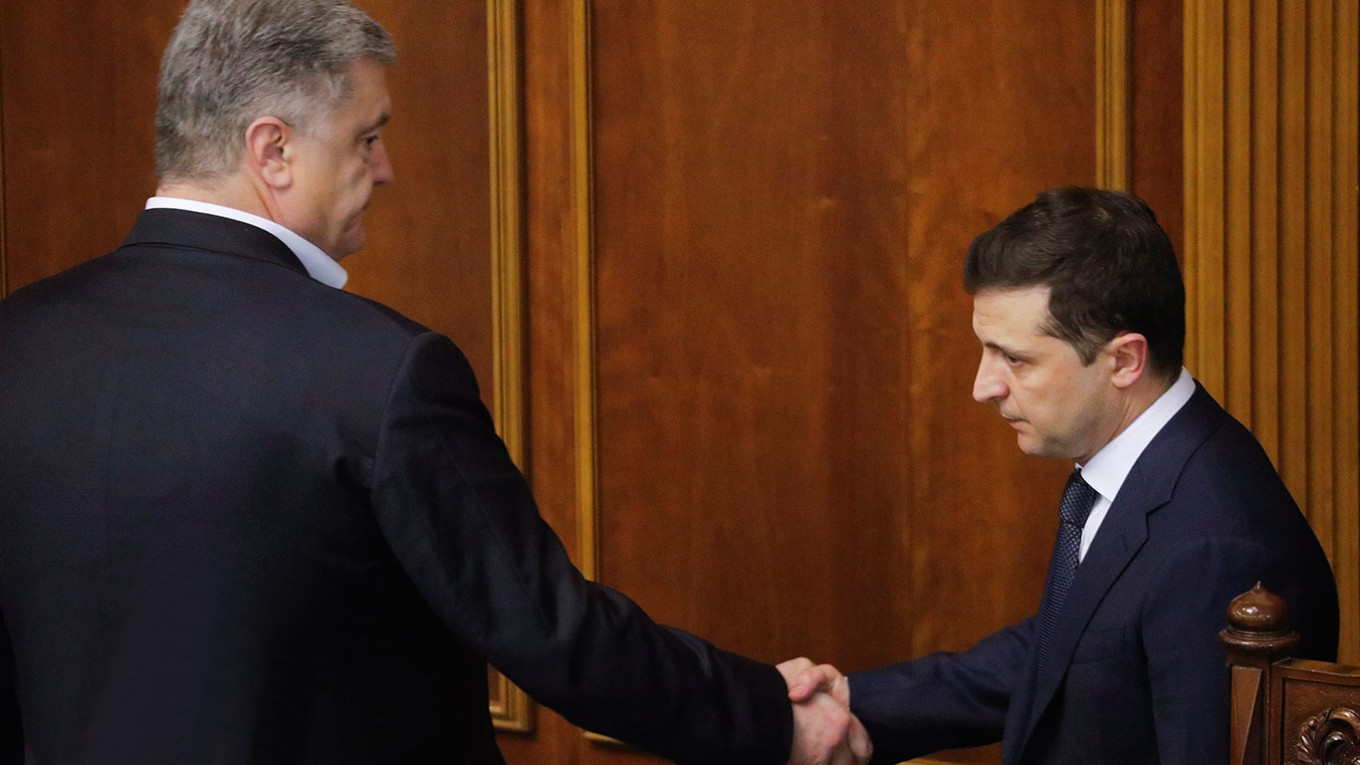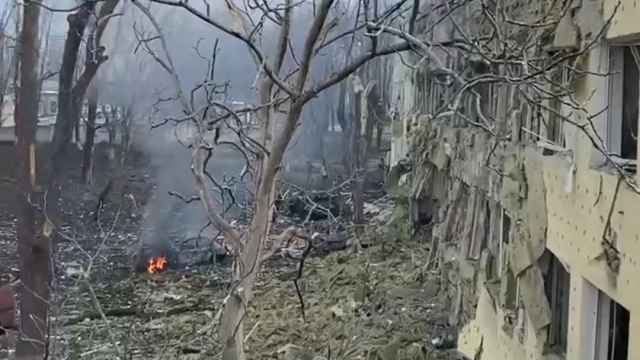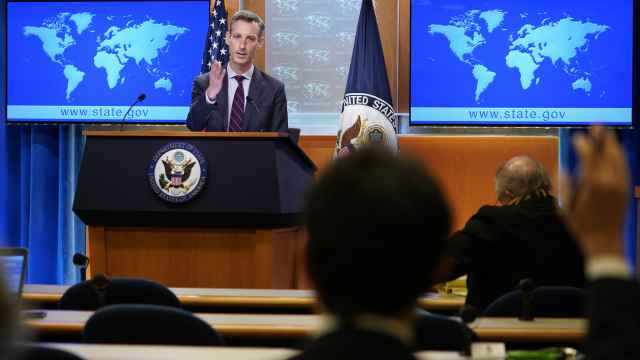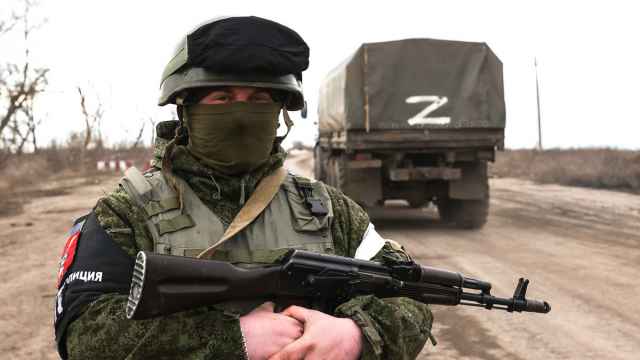The longer the international tension over Ukraine goes on for, the shakier the country’s political system becomes. Faced with a foreign threat, the Ukrainian elites have shown themselves to be unwilling to overcome their differences. Instead, they are making use of this critical moment to settle old scores.
It’s a Ukrainian tradition that the battle for power never stops. For both the pro-Western and pro-Russian opposition, any confrontation linked to a geopolitical choice — never mind one this high profile — creates the perfect opportunity to boost their popularity and score points against President Volodymyr Zelenskiy.
The biggest beneficiaries of the standoff against Russia are those known as the “national patriots.” Amid the current fears of a Russian invasion, former president Petro Poroshenko is once again becoming the most influential figure on the right of Ukrainian politics — as well as Zelenskiy’s main opponent. Poroshenko is now polling just 2–3 percentage points behind the president, while his party, European Solidarity, is overtaking Zelenskiy’s Servant of the People, according to the latest polls.
With the threat of war looming over the country, even those who recently mocked the former president can no longer see any alternative to him. After all, it was Poroshenko who led Ukraine during the military conflict in the country’s east in 2014–2015. His tactic right now is to do everything within his means to attack Zelenskiy’s administration for failing to take the Russian threat seriously.
The Poroshenko camp is also pinning its hopes on getting support from the West, which is becoming increasingly disenchanted with Zelenskiy over his criticism of his allies, whom he has reproached for not providing sufficient help and for inflaming tensions.
Poroshenko’s main problem is the number of Ukrainians who fiercely dislike him following his years in power.
That number has not changed, and no one is in a hurry to join forces with the former president in a coalition against Zelenskiy: they are wary of his toxic image. On his own, however, Poroshenko does not yet have the resources to defeat the ruling regime.
The international escalation over Ukraine has also activated the pro-Russian wing of the country’s opposition. On the one hand, living in constant fear of a Russian invasion only makes Ukraine’s pro-Russian parties seem more odious than ever. On the other hand, the country’s predominantly Russian-speaking regions are growing increasingly frustrated with the government for having become embroiled in an all-consuming confrontation with the Kremlin when Zelenskiy had run on a promise of peace. This frustration could in future be converted into votes, and with that in mind, competition among the various groups is already raging.
Since Viktor Medvedchuk, the leader of the main pro-Russian party, Opposition Platform–For Life (OPFL), was placed under house arrest and hit with sanctions by the Ukrainian government, the party’s leadership has joined the group of gas tycoons consisting of Serhiy Lyovochkin, Yuriy Boyko, and Dmytro Firtash. Firtash recently presented the group’s political manifesto: a neutral, nonaligned status for Ukraine, and its transformation into a bridge between Russia and Europe: the “Switzerland of Eurasia.”
Another pro-Russian politician propelled into the limelight by the escalation over Ukraine is Yevhen Murayev, leader of the Nashi party. He found himself at the center of attention recently when the UK Foreign Office claimed that the Kremlin was considering him as a candidate to head up a puppet government in occupied Ukraine.
Murayev has long been seen by the OPFL as a dangerous rival. In 2018, Russia imposed sanctions against him at the behest of Medvedchuk, and it’s rumored that Firtash, who has connections to the British establishment, is behind the Foreign Office report. In the unstable world of Ukrainian politics, it’s hard to predict what impact this sudden international notoriety will have on Murayev’s popularity. It’s possible that the OPFL may manage to sideline him as a pro-Russian radical, painting themselves as moderates in comparison. Or the reverse may happen: Murayev may manage to create an image as a moderate centrist under attack on both sides, from both Russia and the West.
The only politician not benefitting from the current crisis is Dmytro Razumkov, the former parliamentary speaker. Until recently, he appeared to have the best prospects of any Ukrainian politician, but his moderate, balanced approach is at odds with the current atmosphere, in which emotions are running high. Razumkov can, however, afford to simply wait: the niche he has set his sights on is currently occupied by Zelenskiy, who is under attack from all sides.
Yet again, Zelenskiy is faced with a crisis even worse than all the previous ones. Every day that the standoff continues, and every report of another Russian plan to attack Ukraine are blows to its economy, weakening the hryvnia, pushing up interest rates on loans, and sowing panic among the public. Confronted with all of this, Zelenskiy has decided not to leave Ukraine’s fate in the hands of its Western allies by meekly awaiting help, but criticizes them constantly, reproaches them for inaction, and asks for concrete measures.
When the West threatens Russia with sanctions in the event of aggression, Zelenskiy demands preventative measures, fearing a repeat of the events of 2014, when Russian forces had occupied Crimea before there was anything anyone could do about it. When Western media describe an imminent invasion, the Ukrainian government all but denies it, and calls for everyone to remain calm. When Moscow says there is no point in talking to Kyiv, as it’s merely a puppet of the West, Zelenskiy continues to insist on direct negotiations with Putin.
The president still leads the polls, but the gap between him and his rivals is inexorably decreasing. What’s more, his attempts to quell panic are only making it worse: just like all former Soviet citizens, Ukrainians are used to interpreting assurances from the authorities as confirming their worst fears.
The overall instability could not fail to impact on the president’s Servant of the People party. Recently, it has been unable to get the required number of votes for its initiatives, reducing the president’s parliamentary majority to a mere formality. There’s no obvious solution: if Zelenskiy puts pressure on the Servant of the People deputies, they could desert en masse to join Razumkov, the party’s former leader.
The external threat to Ukraine is exacerbating Zelenskiy’s domestic problems, and vice versa. The result is that the president has become an inconvenient figure for both East and West. Ukraine’s Western allies would prefer to see a more systematic and predictable leader in his place — someone like Poroshenko — who would have heeded their warnings graciously, thanked them for their help, and adhered strictly to the agenda set by those allies.
Moscow, meanwhile, would like to see an end to Ukraine’s protracted drift toward the West and the advent of an if not openly pro-Russian leader, à la Medvedchuk or Boyko, then at least a moderate politician, à la Razumkov. Then the Kremlin would spare no expense to buy their loyalty.
Zelenskiy may be an inconvenient leader for everyone else, but that’s what makes him a suitable leader for today’s Ukraine, since the place it occupies on the map is so inconvenient for everyone. Many would dearly love to wash their hands of it, but it’s not possible. So Zelenskiy remains the most popular politician, even though it would seem he has lost everything he had to lose. Ukrainian society doesn’t always know what it wants, and is intuitively reluctant to make a definitive choice in favor of East or West. Ukrainians believe the world owes them, and they are not ready to compromise.
Zelenskiy does not have many options. He can either stick to his guns in the hope of a change of fortune and the return of his popularity (or at least the failure of the opposition), or he can hold a new referendum of trust in the form of snap parliamentary or presidential elections. Either way, the Ukrainian leader cannot be written off just yet.
This article was first published by the Carnegie Moscow Center.
A Message from The Moscow Times:
Dear readers,
We are facing unprecedented challenges. Russia's Prosecutor General's Office has designated The Moscow Times as an "undesirable" organization, criminalizing our work and putting our staff at risk of prosecution. This follows our earlier unjust labeling as a "foreign agent."
These actions are direct attempts to silence independent journalism in Russia. The authorities claim our work "discredits the decisions of the Russian leadership." We see things differently: we strive to provide accurate, unbiased reporting on Russia.
We, the journalists of The Moscow Times, refuse to be silenced. But to continue our work, we need your help.
Your support, no matter how small, makes a world of difference. If you can, please support us monthly starting from just $2. It's quick to set up, and every contribution makes a significant impact.
By supporting The Moscow Times, you're defending open, independent journalism in the face of repression. Thank you for standing with us.
Remind me later.








